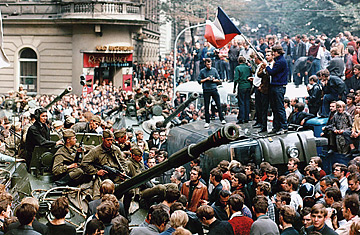
Czechs wave the Czechoslovakian flag atop an overturned truck as other Prague residents surround Soviet tanks in Prague, Czechoslovakia, August 21, 1968.
On the Russians, he is unrepentant: "It was a shock," says Ungr, who had been six times to the "Soyuz" (Russian shorthand for the Soviet Union), of what is now referred to as the 1968 Soviet occupation. "We were hugging them just moments ago and now we should fight? Those boys who came here, it was not their fault."
Whitewash signs reading "Brezneves," (Brezhnev's Village, after the Soviet leader) appeared on Zajecov walls overnight, and neighboring villagers refused potatoes "the boys" had helped to harvest. But since the fall of communism, the potato fields gave way to grasslands, and the locals are reluctant to talks about this less than glorious chapter of their village's past.
"Elsewhere folks were turning around traffic signs, so Russians do not reach Prague. Here they embraced them. It's a shame," says a 19-year-old kid sipping beer on a bench by a grocery store, who gave his name as Tomas.
But, if the Czech parliament approves plans to deploy a U.S. missile shield facility in the nearby hills, U.S. personnel are unlikely to be welcomed as the Red Army once was. The village that has yet to shake off its Brezhnev Village nickname is hardly ready to be dubbed Bush Town.
"We've had enough of soldiers," gripes 64-year-old Marie Markova. "Why do we always have to have a whip above us? First Russian, then American."
Although Ungr has signed a petition against the deployment of the U.S. radar base, opposition is not being driven by the communist old guard. Most of the people of Zajecov fear that the Son of Star Wars could bring their peaceful village anything from radiation to terrorism.
"Please help us," a middle-aged town-hall clerk in a pink blouse pleads, repeating three times, "We don't want it here," before the Zajecov mayor enters his office.
"What can we expect to come out of this?" sneers 66-year-old Josef Hruby. "Are we going to once again teach kids to put on gas masks and hide in shelters?"
Mayor Hruby, who drove an ambulance before taking office eight years ago, can't conceal his rage at a government that is refusing to "ask the people" to decide in a nationwide vote whether to accept the missile shield facilities on Czech soil. Not seeing a single benefit to having American troops in his backyard, he would certainly vote no.
"We will be permanently targeted," he says before he paints a grim-yet-goofy picture of a possible terrorist attack on Czech soil: "A dam blows up and Saint Wenceslas [represented by his statue in Prague] will get his feet wet."
There is no money with which the bigwigs could buy him over, Hruby continues. While Zajecov could use help in building its sewerage system, the locals would rather "carry water in buckets" than agree to the American facility.
"We handed our heaters over to whomever came," says Hruby, summing up the Czechs' encounters with the armed forces that passed through his country during the wars of modern history. "We should rather plant potatoes than radars."
